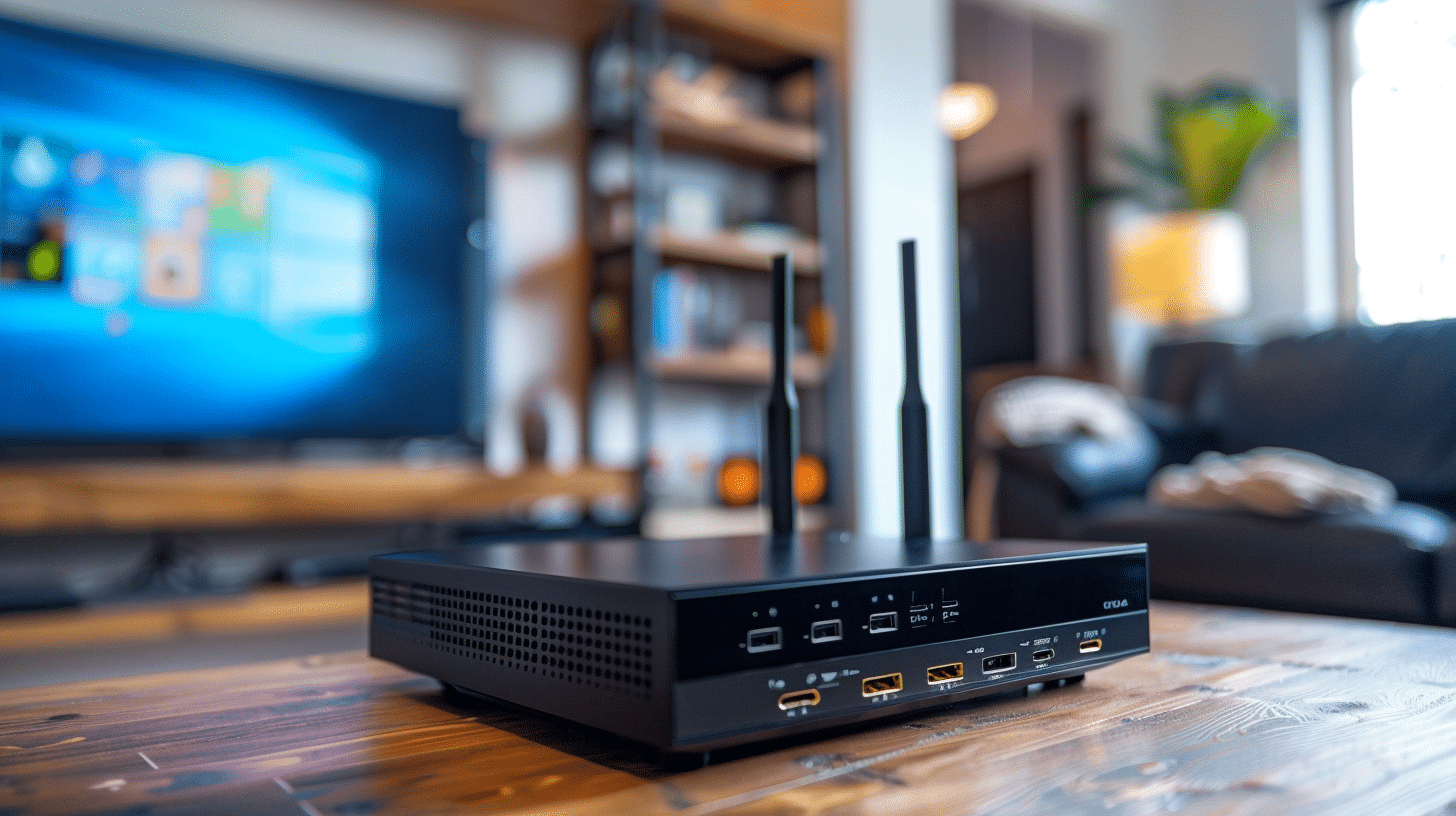
DealHack Guides
13 Smart Ways to Save Big on Your Home Internet Bill
13 minute read
Are you tired of overpaying for your home internet? You're not alone. In an era where every penny counts, finding ways to reduce your monthly internet bill without compromising quality is a game-changer. At Dealhack, we specialize in uncovering the best money-saving hacks, and today, we're sharing 13 proven strategies to help you slash your home internet costs.
Get ready to save big because your wallet deserves a break.
In this post, you’ll learn:
How to negotiate with your internet service provider (ISP) for better rates.
About the benefits of bundling services and how it can lower your monthly bill.
Expert tips on reducing data usage to avoid unnecessary overage charges.
Insider tips to optimize your Wi-Fi setup for better performance.
About the importance of choosing the right internet speed for your needs.
Ways to leverage government programs to reduce your bill.
1. Negotiate with Your ISP for a Better Deal

Most people don’t realize they can negotiate with their internet service provider (ISP) to lower their monthly bill. ISPs often offer better rates to new customers, but if you’re a loyal customer, there’s no reason you shouldn’t benefit from a discount too.
How to Negotiate:
Research Competitor Prices: Gather information on prices and packages from other providers to leverage.
Be Polite but Firm: Call your ISP, ask for the retention department, and express your desire to stay if they offer a better rate.
Mention Competitor Offers: Highlight any better deals you've found elsewhere to encourage your ISP to match or beat them.
Pro Tip: Many ISPs offer discounts for bundling services, so if you also need cable or phone service, inquire about bundle deals.
2. Choose the Right Speed for Your Needs
Paying for more speed than you need is a common mistake that can significantly inflate your internet bill. Understanding your household’s internet usage can help you select the most cost-effective plan.
Understanding Speed Requirements:
Light Usage (1-2 Users): For basic browsing, social media, and occasional streaming, a plan with 10-25 Mbps is sufficient.
Moderate Usage (2-4 Users): For multiple devices streaming HD videos, online gaming, and frequent downloads, consider 50-100 Mbps.
Heavy Usage (4+ Users): A plan with 100+ Mbps is recommended for large households that use simultaneous 4K streaming, video conferencing, and gaming.
Pro Tip: Conduct ISP speed tests to assess your usage needs before upgrading your plan to ensure you get the needed speed.
3. Bundle Your Services

Bundling your internet with other services like cable TV or phone can save you much money each month. Most ISPs offer discounts when you combine services, making it a great way to lower overall costs.
Advantages of Bundling:
Cost Savings: Bundling can save you anywhere from 10% to 30% on your total bill.
Convenience: One bill for multiple services simplifies payments and helps you avoid missed payments.
Promotional Offers: ISPs often offer special promotions for bundled services, allowing customers to take advantage of introductory rates.
Pro Tip: Before bundling, evaluate whether you truly need all the services included in the package. Sticking with standalone internet may be more cost-effective if you don’t watch much TV or use a landline.
4. Purchase Your Modem and Router
Renting equipment from your ISP might seem convenient, but it’s often more expensive in the long run. Purchasing your modem and router can save money and give you better control over your home network.
Rental Cost: If your ISP charges $10 monthly to rent a modem/router, you pay $120 annually. Over two years, that’s $240 enough to buy your high-quality equipment.
Purchased Equipment: Investing in a modem/router combo typically costs $80-150 upfront. After the first year, you start saving, and you’ll likely experience better performance and fewer connectivity issues.
Pro Tip: Before purchasing, check with your ISP to ensure compatibility with their service. Many ISPs provide a list of approved equipment on their website.
5. Limit Data Usage to Avoid Overages

Many internet plans come with data caps, and exceeding these limits can lead to costly overage fees. Monitoring and managing your data usage can help you stay within your plan’s limits and avoid unnecessary charges.
Tips to Reduce Data Usage:
Optimize Streaming Quality: Streaming in HD or 4K consumes a lot of data. Consider lowering the video quality to SD (standard definition) when streaming, especially on smaller screens like phones or tablets.
Set Data Limits on Devices: Use your router's settings to set data limits for specific devices in your home. This can help prevent overages by controlling the data each device can use.
Monitor Usage Regularly: Many ISPs offer online tools or apps for monitoring data usage. Monitor your consumption, especially if your household uses data-heavy services like video streaming or gaming.
Pro Tip: If you consistently exceed your data cap, consider upgrading to an unlimited data plan, which may be more cost-effective than overage fees.
6. Take Advantage of Promotional Offers
ISPs frequently offer promotional rates to attract new customers. Even if you’re an existing customer, it’s worth checking if you can take advantage of these deals to lower your bill.
How to Leverage Promotions:
Check for Offers: Visit your ISP’s website frequently to find promotions and request them, as they may not be automatically applied.
Negotiate at Contract Renewal: Use promotional offers as leverage when renewing your contract to secure a better rate.
Consider Switching Providers: If your ISP doesn’t lower the price, switching to a new provider with promotional rates might be a better option. Just be sure to check for early termination fees.
Pro Tip: Monitor competitor offers and use them as leverage when negotiating with your current ISP to get the best possible deal.
7. Utilize Government Programs

In the United States, several government programs are available to help eligible households save on internet costs. These programs are designed to make internet access more affordable for low-income families.
Key Programs to Explore:
Affordable Connectivity Program (ACP): Affordable Connectivity Program (ACP) Provides up to $30 monthly off internet bills for eligible households. Check the program’s website to see if you qualify.
Lifeline Program: Lifeline Program offers a discount on internet or phone service, typically around $9.25 per month, varying by state.
Emergency Broadband Benefit (EBB): Emergency Broadband Benefit (EBB) is A temporary program from the COVID-19 pandemic offering significant broadband discounts. Explore this option if you qualify before it ends.
Pro Tip: To apply for these programs, you must provide proof of eligibility, such as participation in a federal assistance program or a low-income status. Visit the official websites of these programs for detailed application instructions.
8. Optimize Your Wi-Fi Setup

A poorly configured Wi-Fi network can lead to slow speeds and spotty coverage, causing you to think you need a more expensive plan. Optimizing your Wi-Fi setup can enhance your internet experience without requiring an upgrade.
Steps to Optimize Wi-Fi:
Place Your Router Centrally: Position your router centrally to ensure even coverage. Avoid placing it near walls, metal objects, or other devices that can interfere with the signal.
Use a Wi-Fi Extender: For large homes or areas with weak signals, consider using a Wi-Fi extender to boost your router’s signal and improve coverage.
Update Firmware Regularly: Keep your router’s firmware up to date to benefit from the latest performance enhancements and security updates.
Pro Tip: If your router is over a few years old, it might be time to upgrade to a newer model. Newer routers offer better range, faster speeds, and support for more devices.
9. Cancel Unnecessary Services

If you’re paying for bundled services like cable TV or a landline phone that you no longer use, consider cutting the cord. Many households are switching to streaming services and mobile phones, which can be more cost-effective.
Cutting the Cord:
Switch to Streaming Services: Replace expensive cable packages with streaming services like Netflix, Hulu, or Disney+, which are often more affordable and flexible.
Ditch the Landline: If you rely on cell phones, cancel your landline to save $20 or more each month.
Reevaluate Service Bundles: Consider unbundling your services. Paying for standalone internet and a few streaming services might be cheaper than your current bundle.
Pro Tip: If you do cut cable, invest in a quality HD antenna to access free local channels for news and sports.
10. Share Your Internet Connection
Sharing your internet connection with a trusted neighbor or friend can be a simple way to split costs. This arrangement works best if you live close to each other and maintain a strong Wi-Fi signal between homes.
How to Share Internet Securely:
Set Up a Guest Network: Create a separate guest network through your router to keep your leading network secure while giving your neighbor internet access.
Split the Bill: Agree on a fair way to divide the internet cost, whether evenly or based on usage.
Monitor Usage: Monitor your data usage to avoid exceeding your plan’s limits. If necessary, consider upgrading to unlimited data.
Pro Tip: Use a Wi-Fi range extender to boost the signal between homes, ensuring a strong connection between parties.
11. Regularly Review Your Bill

Internet bills can be full of surprises, from hidden fees to unexpected rate hikes. Make it a habit to review your bill every month to catch any discrepancies.
What to Look For:
Hidden Fees: Look for charges labeled as “administrative,” “service,” or “maintenance,” which may be negotiable.
Promotions Ending: Track when your introductory offers expire, and be ready to renegotiate or switch providers.
Unused Services: Ensure you’re not paying for services or features you don’t use, like extra email accounts or security services.
Pro Tip: If you spot any unexpected charges, contact your ISP immediately. Be polite but firm in requesting a refund or removal of unnecessary fees.
12. Take Advantage of Seasonal Deals
ISPs often run promotions during certain times of the year, like back-to-school season or around major holidays. Timing your sign-up or contract renewal to coincide with these deals can result in significant savings.
When to Look for Deals:
Back-to-School: Late summer is a prime time for internet deals, as ISPs target families preparing for the new school year.
Black Friday/Cyber Monday: Many ISPs offer discounts and special promotions during these major shopping events.
End of Year: As the year wraps up, ISPs may offer discounts to lock in new customers before the new year.
Pro Tip: If you’re not hurrying to switch plans, consider waiting for these seasonal deals to maximize your savings.
13. Refer Friends and Family

Many ISPs offer referral bonuses when you recommend their service to friends or family. These bonuses can range from bill credits to cash rewards, helping you reduce your internet costs.
How Referral Programs Work:
Check Your ISP’s Referral Program: Visit your ISP’s website or contact customer service for details and your unique referral link or code.
Spread the Word: Share your referral link with friends and family looking for a new internet service. Both you and the new customer will benefit.
Earn Rewards: Once confirmed, you’ll receive rewards, usually as a bill credit or cash bonus.
Pro Tip: Some ISPs offer unlimited referral bonuses, so the more people you refer, the more you can save.
Internet Cost-Saving Tips Summary Table
| Tip | Approximate Cost | Short Description |
| Negotiate with Your ISP | Free | Call your ISP to request a lower rate, using competitor offers as leverage. |
| Choose the Right Speed | Potential savings of $10-$30/month | Match your internet plan to your usage to avoid paying for unnecessary speed. |
| Bundle Services | Savings of 10%-30% on your bill | Combine internet with TV or phone services for a discounted bundle rate. |
| Buy Your Equipment | $80-$150 (one-time cost) | Purchase a modem and router to avoid monthly rental fees from your ISP. |
| Limit Data Usage | Potential savings on overage fees | Monitor and reduce data usage to stay within your plan’s limits. |
| Leverage Promotions | Potential savings of $10-$50/month | Take advantage of promotional offers, even as an existing customer, to lower your bill. |
| Utilize Government Programs | Savings up to $30/month | Apply for programs like the Affordable Connectivity Program to reduce your internet costs. |
| Optimize Your Wi-Fi Setup | $20-$50 (for a Wi-Fi extender) | Improve your home Wi-Fi performance by optimizing router placement and using extenders if necessary. |
| Cancel Unnecessary Services | Savings of $20-$100/month | Cut the cord on services like cable TV or landlines that you no longer need. |
| Share Your Connection | Savings of 50% on your bill | Share your internet connection with a trusted neighbor and split the costs. |
| Review Your Bill Regularly | Free | Regularly check your bill for hidden fees or unexpected charges and dispute them with your ISP. |
| Time Your Sign-Up for Deals | Savings of $10-$50/month | Sign up or renew during seasonal sales to take advantage of special promotions. |
| Refer Friends and Family | Savings or cash rewards | Earn referral bonuses from your ISP by recommending their service to others. |
Conclusion
By implementing these 13 tips, you can significantly reduce your home internet costs without sacrificing quality or speed. From negotiating with your ISP and optimizing your Wi-Fi setup to taking advantage of government programs and seasonal deals, there are plenty of ways to keep more money in your pocket.
At Dealhack, we’re passionate about helping you find the best money-saving hacks and discount codes to make your life easier and more affordable. Start applying these strategies today, and enjoy a faster, more affordable internet experience.
FAQ
Can I really negotiate my internet bill with my ISP?
Yes, many ISPs will offer discounts or deals, especially if you mention competitor offers.
How do I know if I’m paying for more internet speed than I need?
Assess your usage. If you mainly browse or stream in HD, you likely don’t need the highest-speed plan.
Is it worth buying my modem and router?
Yes, buying your own saves on rental fees and often improves performance.
What should I do if my ISP offers no current promotions?
Try negotiating for loyalty discounts or look into switching providers for a better offer.
How can I reduce my data usage to avoid overage charges?
Lower streaming quality, set data limits, and avoid large downloads during peak times.
Are there any government programs that can help me save on my internet bill?
Yes, programs like ACP and Lifeline offer discounts for eligible low-income households.
What are the benefits of bundling my internet with other services?
Bundling can save money and is convenient but only if you need all the services offered.
How can I ensure my Wi-Fi signal covers my entire home?
Place the router centrally, use extenders, and keep the firmware updated for optimal coverage.
What should I look for on my monthly internet bill?
Check for hidden fees, unexpected charges, and any rate changes.
Is it safe to share my internet connection with a neighbor?
Yes, but use a secure guest network and agree on cost-sharing.


